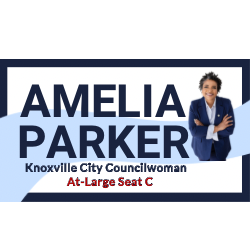To stop the rise in gun violence, we must take action
The state of Tennessee must treat gun violence as the public health emergency that it is and work with cities to better understand and adequately fund the strategies we must implement to address it. However, when the state fails to take action, cities must step up to keep their residents safe and healthy. The evidence shows that investments in community-based gun violence interventions are not only effective at reducing community violence, particularly gun violence, but they also save cities money. The city of Knoxville must commit the funding necessary to ensure violence intervention work is well resourced in our city. Doing so will better address the problem, free up our law enforcement to focus on solving crimes rather than trying to predict them which does not work, and create healthier, safer communities where our youth can thrive. Read below for ways to take action in Knoxville to ensure we as a city make the needed investments in violence intervention.
The FY 23 state budget contains $150 million to support violent crime intervention grants in our state but only law enforcement agencies may apply. Despite the fact that resources for traditional law enforcement continue to increase, we must hold steadfast as a community to the strategies that have been shown to work to reduce violence and create safer, healthier communities. We must invest in community-based solutions and stop any attempt to further over police our communities.
Call on the Kincannon Administration to Increase Future Funding of Violence Prevention Work
Gun-related deaths among youth are not a new occurrence in Knoxville. It was not long ago that our city gained national attention following the shooting death of 15-year-old Zaevion Dobson who lost his life while shielding three young girls from gunfire. At the time, the city was a part of Cities United and had formed the Save our Sons program two years prior to the string of murders that occurred during the time. After Zaevion's death, the mayor doubled the budget of the Save Our Sons office and more than tripled the funding going to violence intervention programs, increasing the budgeted amount to $381,000 in the FY 17 budget. Read more about the work accomplished during that period here.
In comparison, the city of Knoxville spent $167,879.80 in FY 21 of the $1 million budgeted. And as of March 1, 2022, only $83,782.45 had been spent of the $1 million budgeted in FY 22. In April 2021, Councllwoman Seema Singh introduced a resolution respectfully requesting the Administration earnestly consider allocating funding separate from traditional funding for police and fire in the FY 22 budget and future budgets to reduce and prevent crime as well as fund interventional programming. The resolution passed without mention of the $6 million annual commitment for which Councilwoman Singh and others were calling, a level of funding needed to respond to the record breaking number of gun homicides in our city. particularly of young people, in a manner that provides longterm solutions by addressing root causes of the violence and avoids police-centric measures that target communities of color and result in mass incarceration that only perpetuates the cycle of violence.
We must commit as a city to a public health approach to gun violence, increase the funding going to this work in future budgets, and abandon the current police-centric approach that has proven costly, ineffective, and traumatizing to communities.
Funding for violence intervention/prevention under the Kincannon Administration has gone to the following thus far:
- Spring break micro-grants 2022, $27,647.98 to 10 organizations
- Summer Youth Violence Prevention Grants 2021 Pilot Program, $180,161.99
- Youth Violence Prevention Week Microgrants, approximately $23,070 to 8 organizations
- Street Outreach planning agreement with Socially Equal Energy Efficient Development (SEEED), $25,000
- Crime Stoppers position, $75,000 — The money covers the salary of the director of the Knoxville Crime Stoppers program. It was originally approved by Council for $69,910. The program has been led by interim director Stacey Payne.
- Office of community safety, $105,000 (annual salary) — This is the salary for the new created position of director of community safety, a position filled by LaKenya Middlebrook.
- Program site visit, $1,853.81 — City officials traveled to Memphis in 2021 for a Urban Peace Institute training and visited Louisville, Kentucky, where Cities United helped facilitate visits with No More Red Dots and the University of Louisville Medical Center.
- The Health Alliance for Violence Intervention Conference, $1,375 — The conference brings experts together from across the country to share best practices, lessons and research on violence intervention, healing equity and community partnerships. The 2021 conference was virtual.
- Holiday Celebration with Mothers of Mission Survivors and Moms Demand Action, $1,045 — The city helped donate to the annual holiday celebration for these organizations that are geared specifically for helping mothers cope with losing children, largely to gun violence.
- Cities United, $41,150 — Originally a $75,000 violence prevention contract, the city scaled back its agreement with Cities United after leaders were not pleased with the rollout of the program.

